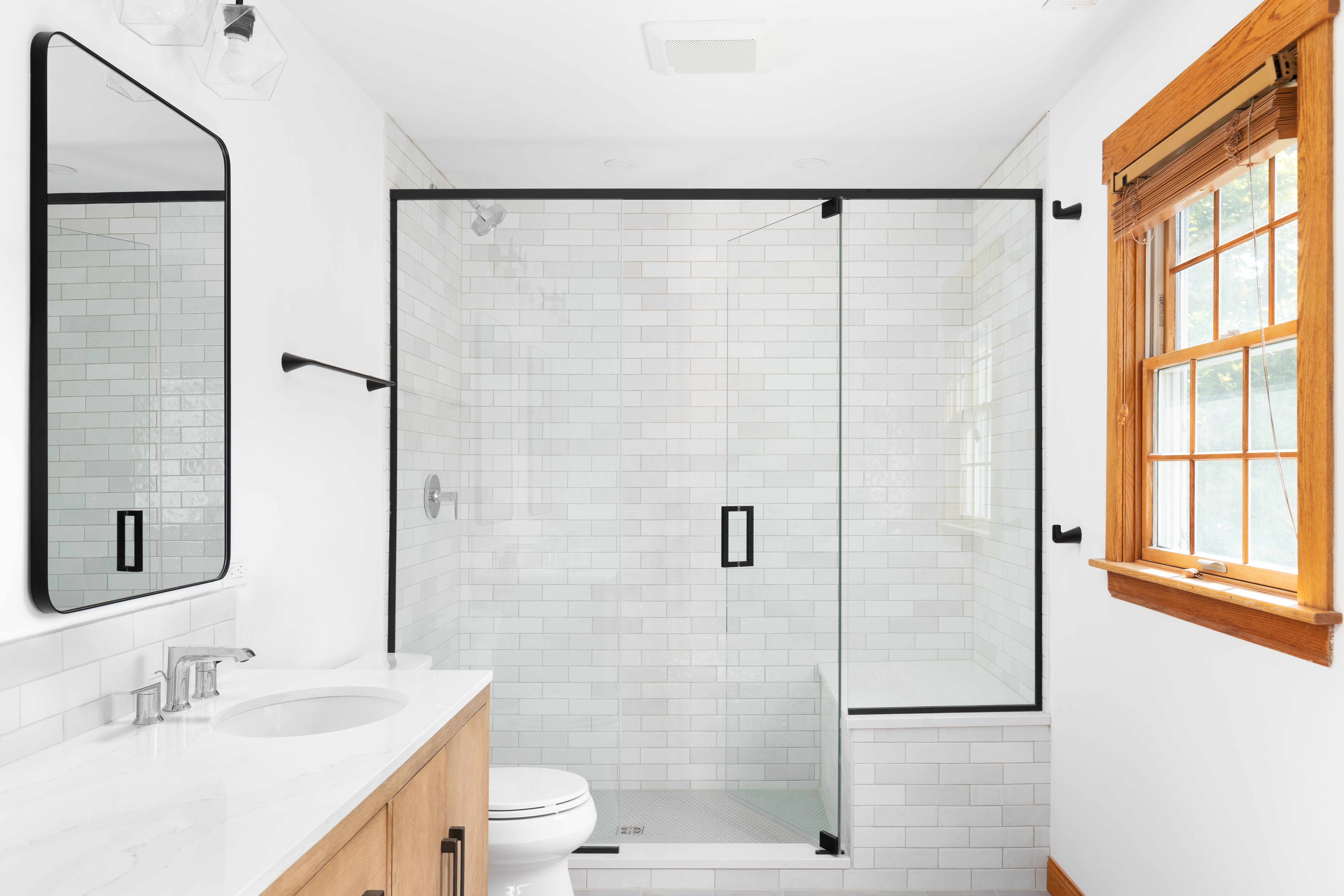
Remodeling your bathroom can add significant value to your home. Your bathroom remodel cost in Columbus, OH will depend on size, fixtures, materials, labor, and other factors.
Sweet dreams await


Bedroom renovations take one to three weeks on average.
Cosmetic renovations like new paint and carpeting can take just one week.
Any major overhauls or structural changes could take a month or more.
Ask friends and family for contractor referrals to find the best renovation pro.
If you spend your nights dreaming of a beautiful new sleeping sanctuary, you’re likely wondering: how long does it take to renovate a bedroom? Most bedroom renovations take about one to three weeks on average, but how simple or lofty your design goals matter. If it’s just a quick refresh with a bit of paint and some new curtains, you can finish your bedroom makeover in a week. More extensive renovations, such as adding millwork, new floors, or building a closet, can lead to a lengthier renovation timeline of four to six weeks.
Get a better idea of how long your bedroom renovation will take and learn some home renovation do’s and don'ts.
For less invasive renovations, you can expect a timeline of one to two weeks of actual work. More extensive projects can last as long as four to six weeks. If you aren’t sure what your renovation plans are, as a heads up, an average timeline of one to three weeks is par for the course.
While all renovations have their own unique timelines based on factors like material availability and your contractor’s schedule, you can generally expect to follow this basic timeline:
Planning: One to two weeks to finalize design, budget, and materials. Creating a bedroom remodel checklist can help you stay on track.
Demolition and prep: One to three days to remove old materials and prepare the space.
Electrical, plumbing, and framing: Three to five days if structural or utility changes are needed.
Drywall and insulation: Two to four days for installation and finishing.
Flooring: One to three days, depending on the material.
Painting and finishing: Two to five days for walls, trim, and final touches.
Furniture setup: One to three days for delivery and arrangement.
When planning a renovation, it’s always a good idea to factor in some wiggle room for delays. Delays can occur due to material availability, scheduling, or unforeseen issues, so allowing some flexibility in your timeline is essential.

To help you get a better idea of what your bedroom renovation timeline may look like, these are some factors to consider that can affect how quickly a home renovation project wraps up.
Scope of the renovation: The most significant factor affecting how long a renovation takes is the scope of the work. A minor refresh, like repainting, may only take a weekend. However, a complete renovation that involves structural changes, new flooring, electrical work, or custom built-ins could stretch over several weeks or even months. It’s also important to remember that the more extensive your plans are, the more the bedroom renovation costs.
Size of the bedroom: The size of the bedroom directly impacts the renovation time. Larger bedrooms naturally take longer to paint, lay flooring, or install new fixtures. On the other hand, small bedrooms may take less time for simple renovations but may still experience delays for larger projects that involve structural work.
Availability of materials: One aspect that can slow down a bedroom renovation is the availability of materials. If you’re ordering custom pieces like built-in closets, specialized light fixtures, or high-end finishes, these items can have lead times of several weeks to months. Delays in delivery could push your renovation schedule back.

Professional vs. DIY renovation: Are you hiring a professional home remodeler near you to take charge or will you handle the renovation yourself? While tackling this renovation yourself can save money, it may take longer—especially if you lack experience in certain tasks. Hiring professionals can simplify and speed up the process as they can work efficiently and coordinate with other trades, such as electricians and plumbers.
Permits and Inspections: In some cases, a renovation may require permits, especially if you're altering the structure, installing new windows, or modifying electrical and plumbing systems. Acquiring permits and scheduling inspections can add extra time to the project, particularly if local regulations slow down the process.
During a home renovation, you may need a place to stay for a few weeks or months. First, ask friends or family if they can host you during the project's duration. If that's not an option, you can look into renting a small furnished home or apartment with a short-term or month-to-month lease. Vacation rental sites may also offer a good value if you book for an extended stay—especially if it's off-season. Remember: furnishings and flexibility are key.
If you want to speed up a bedroom renovation, thorough planning will be the secret to your success. Start by finalizing the design, materials, and contractor choices early. Order all supplies, including paint, flooring, and furniture, ahead of time to avoid delays caused by backorders or shipping issues.
You can also streamline the process by tackling cosmetic updates, such as painting and replacing fixtures, before more complex tasks like electrical or structural work. When it comes time for the pros to come in, if possible, simplify the design to minimize time-consuming customizations. For example, choose standard-sized windows or pre-made cabinetry instead of custom-built options.
Lastly, ensure good communication with your contractor to keep the project on track and address any potential issues immediately. Staying organized and prepared can shave off days or even weeks from your bedroom renovation. Not sure who to hire for a home renovation? Ask friends and family for referrals to make sure you hire reliable professionals with proven experience. That way, you better your chances of the work progressing efficiently without mistakes.
From average costs to expert advice, get all the answers you need to get your job done.

Remodeling your bathroom can add significant value to your home. Your bathroom remodel cost in Columbus, OH will depend on size, fixtures, materials, labor, and other factors.

Whether you're dreaming up a new office or a peaceful sunroom, home addition costs will shape your design. Learn what to expect for every vision.

How much does a showerhead cost? Whether your current showerhead is broken or you want more pressure, you have many options to upgrade your showering experience. Learn the average price for various showerheads, features, and more.

An updated bathtub can give a bathroom a whole new look. Find out how much it costs to replace a bathtub in Denver, CO, including prices by type and labor costs.

If your shower door has been acting up, it’s time to get it back in working order. You can adjust a shower door with some common adjustments.

An updated bathtub can give a bathroom a whole new look. Find out how much it costs to replace a bathtub in Atlanta, GA, including prices by type and labor costs.